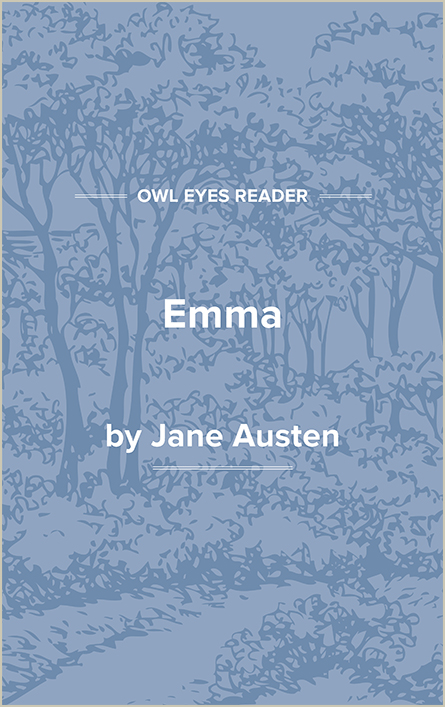Analysis Pages
Facts in Emma
Facts Examples in Emma:
Volume I - Chapter I
🔒"Highbury, the large and populous village,..." See in text (Volume I - Chapter I)
"wedding visit..." See in text (Volume I - Chapter I)
Volume I - Chapter II
🔒"morning visit..." See in text (Volume I - Chapter II)
Volume I - Chapter III
🔒"parlour-boarder..." See in text (Volume I - Chapter III)
Volume I - Chapter IV
🔒"Kingston..." See in text (Volume I - Chapter IV)
"Elegant Extracts..." See in text (Volume I - Chapter IV)
"Alderneys..." See in text (Volume I - Chapter IV)
Volume I - Chapter VI
🔒"drawing-room..." See in text (Volume I - Chapter VI)
Volume I - Chapter VIII
🔒"twenty thousand pounds..." See in text (Volume I - Chapter VIII)
Volume I - Chapter IX
🔒"Michaelmas..." See in text (Volume I - Chapter IX)
"mermaid..." See in text (Volume I - Chapter IX)
"Neptune..." See in text (Volume I - Chapter IX)
"charades..." See in text (Volume I - Chapter IX)
"hot-pressed paper..." See in text (Volume I - Chapter IX)
Volume I - Chapter X
🔒"Stilton cheese..." See in text (Volume I - Chapter X)
"shilling..." See in text (Volume I - Chapter X)
Volume I - Chapter XI
🔒"scarlet fever..." See in text (Volume I - Chapter XI)
Volume I - Chapter XII
🔒"old prejudice..." See in text (Volume I - Chapter XII)
"influenza..." See in text (Volume I - Chapter XII)
"Mr. Wingfield's..." See in text (Volume I - Chapter XII)
"spring corn..." See in text (Volume I - Chapter XII)
"drain..." See in text (Volume I - Chapter XII)
Volume I - Chapter XIII
🔒"sheepskin..." See in text (Volume I - Chapter XIII)
"glasses..." See in text (Volume I - Chapter XIII)
Volume I - Chapter XIV
🔒"saddle of mutton..." See in text (Volume I - Chapter XIV)
Volume II - Chapter I
🔒"second-rate and third-rate of Highbury,..." See in text (Volume II - Chapter I)
"Master of the Ceremonies..." See in text (Volume II - Chapter I)
Volume II - Chapter II
🔒"sucking in the sad poison..." See in text (Volume II - Chapter II)
"consumption..." See in text (Volume II - Chapter II)
Volume II - Chapter III
🔒"the warm bath..." See in text (Volume II - Chapter III)
"muffin..." See in text (Volume II - Chapter III)
Volume II - Chapter IV
🔒"10,000 l..." See in text (Volume II - Chapter IV)
Volume II - Chapter V
🔒"pencilled marks and memorandums on the wainscot..." See in text (Volume II - Chapter V)
"espalier apple-trees..." See in text (Volume II - Chapter V)
Volume II - Chapter VI
🔒"half a guinea..." See in text (Volume II - Chapter VI)
"post-horses..." See in text (Volume II - Chapter VI)
"an old woman who had nursed him..." See in text (Volume II - Chapter VI)
Volume II - Chapter VII
🔒"malt liquor..." See in text (Volume II - Chapter VII)

